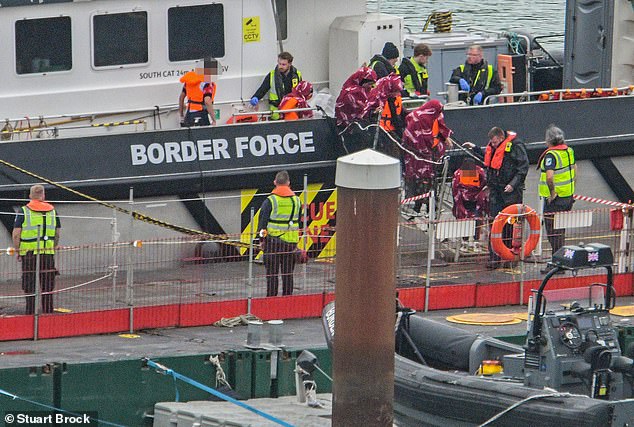Keir Starmer's New Migration Plan: A Response To The Farage Challenge

Table of Contents
Key Pillars of Starmer's Migration Policy
Keir Starmer's migration policy rests on three core pillars: controlled immigration, tackling illegal immigration, and fostering integration and community cohesion. These pillars represent a multifaceted approach designed to address both the economic needs of the UK and the social concerns surrounding immigration.
Controlled Immigration: A Points-Based System
Starmer's plan emphasizes a robust points-based system for skilled workers, aiming to address labor shortages in key sectors while managing overall immigration numbers. This system prioritizes individuals who can demonstrably contribute to the UK economy.
-
Points Allocation Criteria: Points will be awarded based on factors such as:
- High-demand skills and qualifications (e.g., STEM fields, healthcare).
- English language proficiency.
- Job offers from UK employers.
- Prior work experience.
-
Economic Impact: The intention is to attract skilled migrants who can fill critical labor gaps in sectors facing shortages, boosting economic productivity and growth. This contrasts with uncontrolled immigration which can sometimes strain public services.
-
International Comparisons: This points-based system draws inspiration from successful models in countries like Canada and Australia, known for their effective management of skilled migration.
Tackling Illegal Immigration: Border Security and International Cooperation
A key component of Starmer's plan involves strengthening border security and enhancing international cooperation to combat illegal immigration and human trafficking.
-
Border Security Enhancements: This includes increased investment in technology, improved data sharing with other countries, and enhanced training for border force personnel. This will involve utilising advanced technology like facial recognition and biometric scanning to improve border security.
-
International Collaboration: Starmer's plan advocates for closer collaboration with source and transit countries to disrupt smuggling networks and address the root causes of migration. This involves working with international bodies and other governments to address these complex issues effectively.
-
Effectiveness Analysis: The success of these measures will depend on effective implementation and international cooperation. Regular review and adaptation will be crucial to ensure their ongoing effectiveness.
Integration and Community Cohesion: Supporting Migrants' Integration
Starmer's plan also emphasizes the importance of supporting migrants' integration into British society. This involves providing resources and opportunities to help them settle and contribute fully.
-
Proposed Support Programs: These include language training programs, access to education and employment services, and community engagement initiatives to foster social inclusion. This focus on integration is key for building a strong and harmonious society.
-
Social Inclusion: Successful integration is crucial for building strong communities and preventing social division. This requires a concerted effort from government, community organizations and the migrants themselves.
-
Addressing Challenges: Potential challenges include language barriers, cultural differences, and potential discrimination. Addressing these challenges effectively requires a multi-pronged approach involving both governmental and community initiatives.
Addressing the Farage Challenge: A Center-Ground Approach
Keir Starmer's plan directly challenges the rhetoric of Nigel Farage and the populist right on immigration. It seeks to offer a more balanced and nuanced approach that attracts voters concerned about immigration while avoiding the divisive language of the far right.
Differentiation on Key Issues: Refugees and Asylum Seekers
A key point of divergence lies in the treatment of refugees and asylum seekers. While Farage often advocates for stricter controls and limitations on asylum claims, Starmer's plan emphasizes a commitment to international humanitarian obligations. The plan focuses on a fairer and more efficient system for processing asylum applications and providing support to those fleeing persecution.
-
Policy Comparison: Starmer's approach differs significantly from Farage's more restrictive and often xenophobic stance. This is a significant point of differentiation that will likely resonate with many voters.
-
Electoral Impact: This contrast in approaches is expected to have a significant impact on the electoral landscape, particularly amongst swing voters.
Appealing to the Center Ground: A Balanced Strategy
Starmer aims to appeal to the center ground by demonstrating a commitment to controlled immigration, border security, and effective integration. This strategy seeks to reassure those concerned about immigration while also promoting a more welcoming and inclusive society.
-
Political Considerations: This approach is a calculated attempt to attract voters from across the political spectrum, particularly those who are wary of both uncontrolled immigration and overly restrictive policies.
-
Potential Success: The success of this strategy depends on the plan's perceived fairness, effectiveness, and the government's ability to communicate its message effectively.
Potential Strengths and Weaknesses of the Plan
Keir Starmer's migration plan offers a comprehensive approach, but its success depends on several factors.
Economic Impact: Boosting Productivity and Growth
The plan's potential economic benefits stem from attracting skilled workers, filling labor shortages, and boosting productivity. However, the economic impact will also depend on effective implementation and the overall economic climate. Potential downsides include potential strain on public services in the short term if not managed correctly.
Social Impact: Promoting Cohesion and Integration
The plan's emphasis on integration aims to improve social cohesion and foster a more inclusive society. However, successful integration requires sustained effort, community engagement, and resources. Failure to properly integrate new communities could exacerbate social tensions, negating positive economic effects.
Political Implications: Electoral Success and Political Landscape
The political impact is uncertain, depending on public perception, media coverage, and the actions of rival parties. If the plan is seen as effective and fair, it could bolster Starmer's electability. However, negative public perception could significantly harm his chances.
Conclusion
Keir Starmer's new migration plan represents a significant attempt to address a critical issue in British politics. By proposing a balanced approach that combines controlled immigration with robust border security and integration initiatives, Starmer aims to offer a compelling alternative to the more restrictive policies advocated by Nigel Farage. While the success of this plan remains to be seen, its comprehensive nature and attempt to navigate the complexities of the immigration debate deserve careful consideration. The effectiveness of Keir Starmer’s Migration Plan will be determined by its implementation and its ability to address both the economic and social challenges associated with immigration. To learn more about the specifics and potential implications, further research into Keir Starmer’s Migration Plan is encouraged.

Featured Posts
-
 Paddy Pimblett Critiques Dustin Poiriers Retirement
May 05, 2025
Paddy Pimblett Critiques Dustin Poiriers Retirement
May 05, 2025 -
 Wbo Interim Championship Parker And Bakole To Clash
May 05, 2025
Wbo Interim Championship Parker And Bakole To Clash
May 05, 2025 -
 Charissa Thompson Denies Fox News Firing
May 05, 2025
Charissa Thompson Denies Fox News Firing
May 05, 2025 -
 Nyc Filming Bradley Cooper Directs Will Arnett For Is This Thing On Photo 5133881
May 05, 2025
Nyc Filming Bradley Cooper Directs Will Arnett For Is This Thing On Photo 5133881
May 05, 2025 -
 Deutschland Beim Esc Wiener Duo Setzt Auf Erfolg
May 05, 2025
Deutschland Beim Esc Wiener Duo Setzt Auf Erfolg
May 05, 2025
